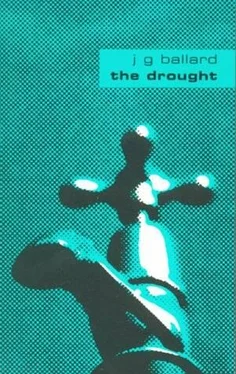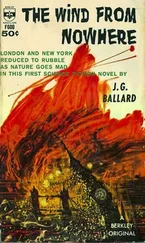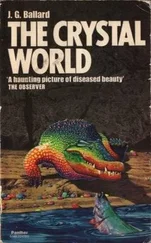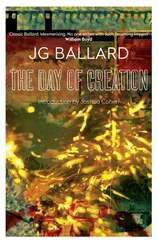"What about the car?" Philip asked.
"Leave it. These people have brought everything with them; they're not going to abandon their cars now that they've got them parked on the sand." He waited for the others to climb out but they sat inertly, reluctant to move. "Come on, Catherine. Mrs. Quilter, you can sleep on the dunes tonight."
"I don't know for sure, doctor." Screwing up her face, she stepped slowly from the car.
"What about you, Mr. Jordan?" Ransom asked.
"Of course, doctor." The old Negro still sat upright. "Just settle me on the sand."
"We're not on the sand." Controlling his impatience, Ransom said: "Philip, perhaps Mr. Jordan could wait in the car. When we've set up some sort of post by the wire, we'll come back and get him."
"No, doctor." Philip watched Ransom carefully. "If we can't take him in the litter, I'll carry him myself." Before Ransom could remonstrate with him, he bent down and lifted the elderly Negro from the car. His strong arms carried him like a child.
Ransom led the way, followed by Catherine and Mrs. Quilter, who fussed along, muttering at the people sitting in the hollows by their cars and trailers. Philip Jordan followed fifty yards behind them, watching his footing in the churned sand, the old Negro in his arms. Soon the road was lost to sight, and the stench of the encampment filled their lungs. A maze of pathways turned between the vehicles and among the dry, grasstopped dunes. Seeing the jerrican partly hidden inside his jacket, children wheedled at Ransom with empty cups. Small groups of men, unshaven and stained with dust, argued hotly with each other, pointing toward the fence. The nearer to this obstacle, the higher tempers seemed to flare, as if the earlier arrivals-many of whom, to judge by their camping equipment, had been there for a week or more-realized that the great concourse pressing behind them meant that they themselves would never reach the sea.
Fortunately the extension of the perimeter fence into the mouth of the river allowed Ransom to approach the wire without having to advance directly toward the sea. Once or twice he found their way barred by a silent man with a shotgun in his hands, waving them away from some private encampment.
An hour later, Ransom reached a point some twenty yards from the outer fence, in a narrow hollow between two groups of trailers. Partly sheltered from the sunlight by the sticks of coarse grass on the crests of the surrounding hillocks, Catherine and Mrs. Quilter sat down and rested, waiting for Philip Jordan to appear. Flies and mosquitoes buzzed around them, the stench from the once marshy ground thickening the air. The trailers nearby belonged to two circus families, who had moved down to the coast with part of their traveling fair. The gilt-painted canopies of two merry-go-rounds rose above the dunes, the antique horses on their spiral pinions lending a carnival air to the scene. The dark-eyed womenfolk and their daughters sat like a covey of witches around the ornamental traction engine in the center, watching the distant shore as if expecting some monstrous fish to be cast up out of the water.
"What about Philip and Mr. Jordan?" Catherine asked when they had not appeared. Shouldn't we go back and look for them?"
Lamely, Ransom said: "They'll probably get here later. We can't risk leaving here, Catherine."
Mrs. Quilter sat back against the broken earth, shaking the flies off her dusty silks, muttering vaguely to herself as if unable to comprehend what they were doing in this flyinfested hollow.
Ransom climbed onto the crest of the dune. However depressing, the lack of loyalty toward Philip Jordan did not surprise him. With their return to the drained river, he felt again the sense of isolation in time that he had known when he stood on the deck of his houseboat, looking out at the stranded objects on the dry bed around him. Here, where the estuary widened, the distances separating him from the others had become even greater. In time, the sand drifting across the dunes would reunite them on its own terms, but for the present each of them formed a self-contained and discrete world of his own.
Nearby, a man in a straw hat lay among the dried grass, peering through the wire at the drained channel running toward the beach. A nexus of narrow creeks and small dunes separated them from the inner fence. Beyond this the recently erected huts were already filling. Several trucks stopped outside them, and some fifty or sixty people climbed out and quickly carried their suitcases indoors.
A large truck hove into view past the huts and headed toward the inner fence. It stopped there, and two soldiers jumped out and opened a crude gate. Rolling forward, the truck bumped across the dunes. As its engine raced noisily, Ransom noticed a concerted movement through the camp. People climbed down from the roofs of their trailers, others stepped from cars and pulled their children after them. Fifty yards away, where the truck stopped by the outer fence, the crowd gathered some three or four hundred strong. The soldiers lowered a fifty-gallon drum off the tailboard and rolled it across the ground.
There were a few shouts as the drum neared the fence, but neither of the soldiers looked up. As they pushed it through the wire the crowd surged forward, drawn as much to these two isolated figures as to their cargo of water. As they climbed into the truck again the crowd fell silent, then came to and burst into a chorus of jeers. The shouts followed the truck as it crossed the open interval and disappeared through the gate. With a whoop, the drum was lifted into the air and borne away, then flung to the ground twenty yards away.
As the spray from the scattered water formed ragged rainbows in the air, Ransom turned away and rejoined the others in the hollow. Mrs. Quilter appeared from the direction of the fun-fair, the straw-hatted man following her. He beckoned Ransom toward him.
"You talk to him, dearie," Mrs. Quilter croaked. "I told them what a marvelous doctor you are."
The straw-hatted man was more precise. He took Ransom aside. "The old romany says you have a gun. Is that right?"
Ransom nodded cautiously. "Fair enough. Why?"
"Can you use the gun? She says you're a doctor."
"I can use it," Ransom said. "When?"
"Soon." The man glanced at Ransom's grimy linen suit and then walked away to the merry-go-round, swinging himself through the antique horses.
Soon after midnight, Ransom lay on the crest of the dune. Around him echoed the nightsounds of the camps, embers of hundreds of fires smoking in the darkness. A dull sullen murmur, punctuated by shouts and gunfire further along the beach, drifted across the sandhills. Below him, Catherine and Mrs. Quilter lay together in the hollow, their eyes closed, but no one else was asleep. The dunes around him were covered with hundreds of watching figures. Listening to the slow uncertain movements, Ransom realized that there was no concerted plan of action, but that some dim instinct was gathering force and would propel everyone simultaneously at the wire.
The lights beyond the fences had been dimmed, and the dark outlines of the huts shone faintly in the light reflected from the waves as they spilled onto the beaches. Only the pumping gear drummed steadily.
Above him somewhere, a wire twanged softly. Peering into the darkness, Ransom saw a man disappear through the fence, crawling down one of the drained channels.
"Catherine!" With his shoe, Ransom kicked some sand onto Catherine's shoulder. She looked up at him and then woke Mrs. Quilter. "Get ready to move!"
On their left, across the channel of the river, more firing broke out. Most of the tracers flew high into the air, their arcs carrying them away across the estuary, but Ransom could see that at least two of the sentries, presumably members of the locally recruited militia, were firing straight into the trailer camp.
Читать дальше
Конец ознакомительного отрывка
Купить книгу








